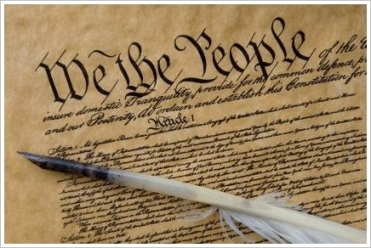�
��������������������������������������������������������

�
�
���������������������������������������������������������������������������� Fill in the blanks in the sentences below with the appropriate words:
salary, suffrage,�demise, casting, quorum, written, enforced, hereditary, counterparts, conservatism, case-law, amendment,�� reforms,��predecessor,�disqualified, neutral, absenteeism, meeting, Speaker, independent, conflict, agreement, crown
�
�
1.����� Although the UK does not have a �constitution, numerous statutes contain provisions about the Constitution.
2.����� Legal cases recorded in the Law Reports contain constitutional principles; thus, is an important source of constitutional law.
3.����� Conventions are rules of political practice: as they are not laws, they cannot be by the courts.
4.����� Whereas in many countries the constitutional texts contain special provisions for any of the Constitution, no such thing exists in Britain, where the Constitution may be altered by the ordinary process of legislation.
5.����� The composition of the House of Lords has been changed by two recent .
6.����� The peers of the UK acquire their title by lineal inheritance.
7.����� Although there were more than 1000 Lords in the House of Lords, attendance was generally below 300. was encouraged by several facts: the premises too small to contain all peers; peers received no for their work; the for the House to be able to sit was only 3, although a minimum of 30 was required for the vote.
8.����� was the rule in the House of Lords: very often the Lords opposed the reforms proposed by the House of Commons.
9.����� The following categories of persons are from membership of the House of Commons: persons under 21, aliens, mentally handicapped persons, peers, bankrupts, persons convicted of treason or felony who have not completed their sentence or been pardoned, persons convicted of corrupt or illegal practices at parliamentary elections, Church ministers.
10.� If the amendments of the House of Lords are rejected by the House of Commons negotiations take place between the two houses until an is reached.
11.� The House of Commons is composed of Members of Parliament (MPs) elected on the basis of universal , who represent the country.
12.� The House of Commons is presided over by the , who, once elected, must be impartial: he only has a vote, i.e. he votes only in the event of a tie.
13.� In case of of laws, statute law prevails over any other form of law.
14. Although it is possible to stand as an , i.e. without party backing, most candidates belong to and have been selected by a political party.
15.� By convention, the male heirs of the Sovereign have precedence over their female to succeed to the throne.
16.� The new Sovereign succeeds to the throne without any delay on the death of his .
17.� The duration of Parliament is not affected by the of the Sovereign: the life of a Parliament continues uninterrupted on the monarch�s death and on the accession of his successor.
18.� The term �� nowadays covers not only the Sovereign, or Monarch. But also his/her Ministers.
19.� As they are politically , civil servants are expected to serve the government of the day, whatever its political colour.
20.� The Cabinet �is a forum in which key policy decisions are taken.
